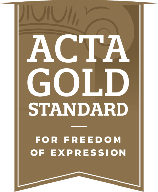
Campus Freedom Initiative™
Free expression is the necessary precondition for the unfettered search for truth on the college campus.
An ACTA Report Card on Free Expression
ACTA’s Campus Freedom Initiative™ (CFI) has evaluated universities in several states against our Gold Standard for Freedom of Expression™, a 20-point action plan for reestablishing higher education’s commitment to excellence and open inquiry. Below we present the University of Pittsburgh’s Gold Standard evaluation. Pitt receives credit for seven out of twenty Gold Standard measures. Our research highlights Pitt’s strengths in protecting free expression and identifies areas it must work on to improve the student experience. Explore the full University of Pittsburgh Gold Standard evaluation to learn more.
 ACTA Gold Standard for Freedom of Expression™
ACTA Gold Standard for Freedom of Expression™| COMMIT TO A CULTURE OF FREE EXPRESSION | Pitt |
|---|---|
| Adopt the Chicago Principles on Freedom of Expression or a similarly strong statement. | No evidence of Pitt adopting the Chicago Principles or a similar statement could be found. |
| Establish clear expectations regarding free expression in student and faculty handbooks and codes of conduct. | |
| Include a free expression unit in new-student orientations. | No materials showing Pitt meets this measure could be found. Requests to university officials for such materials remain unanswered. |
| Protect the diversity of political viewpoints by adopting an institutional neutrality policy such as the Kalven Report. | No evidence of Pitt adopting an institutional neutrality policy could be found. |
| FOSTER CIVIL DISCOURSE | Pitt |
| Sponsor campus debates that model civil discourse. | |
| Promote free expression by encouraging the establishment of student groups devoted to free expression, civil discourse, or representing a plurality of perspectives. | |
| Establish policies that protect free expression rights on campus and set clear consequences for disruption of sponsored speakers, events, and classes. | |
| Enforce policies that protect free expression rights on campus and apply clear consequences for disruption of sponsored speakers, events, and classes. | Evidence suggests that Pitt has not consistently applied its free expression policies across all political student organizations. |
| Cultivate Intellectual Diversity | Pitt |
| Encourage presidents, provosts, and deans to model respect for a broad range of viewpoints. | |
| Guarantee that viewpoint diversity is reflected in student life policies and practices. | Pitt’s Residential Handbook allows students to report bias incidents, which is likely to chill the expression of diverse views. |
| Support academic centers dedicated to free inquiry and intellectual diversity. | No materials showing Pitt meets this measure could be found. |
| Ensure faculty hiring, evaluation, and promotion processes are based on merit and make clear that the institution is open to intellectual diversity. | There is no evidence of a university-wide effort on these issues. |
| Break Down Barriers to Free Expression | Pitt |
| Eliminate speech and IT policies that have a chilling effect on free expression. | |
| Ensure that enforcement of Title VI, Title VII, and Title IX does not infringe on free expression. | Policies defining harassment contain elements likely to chill free expression. |
| Disband bias response teams. | Pitt has a program in place for students to report any bias concerns. |
| Review student government policies to ensure viewpoint neutrality in student group recognition and funding. | |
| Advance Leadership Accountability | Pitt |
| Include commitments to free expression in mission statements, values statements, strategic plans, and other key institutional documents. | Evidence that Pitt meets this measure is insufficient. |
| Include a commitment to free expression as a criterion in searches and evaluations for presidents, provosts, and deans. | No such commitment was made during Pitt’s most recent presidential search. |
| Require free expression and viewpoint diversity training for administrative staff. | Pitt offers training related to this measure, but it does not require such training. |
| Conduct regular surveys or other quantitative studies of students and faculty to assess the state of free expression and intellectual diversity on campus. | No materials showing Pitt meets this measure could be found. Requests to university officials for such materials remain unanswered. |
Based on the responses of 482 undergraduate students collected from May to August 2024, the following report from the American Council of Trustees and Alumni (ACTA) and College Pulse shows that Pitt students are highly inclined to self-censorship. Students also express troubling levels of intolerance for different points of view. These problems often become measurably worse from freshman year to senior year.
View Survey Results65
%of students report self-censoring, fearful of the reactions of fellow students.
70
%of students believe professors who say something they find offensive should be reported.
80
%of students report receiving no training on free expression policies from staff or faculty.

Launched in 1995, we are the only organization that works with alumni, donors, trustees, and education leaders across the United States to support liberal arts education, uphold high academic standards, safeguard the free exchange of ideas on campus, and ensure that the next generation receives an intellectually rich, high-quality college education at an affordable price.
Discover MoreSign up to receive updates on the most pressing issues facing our college campuses.